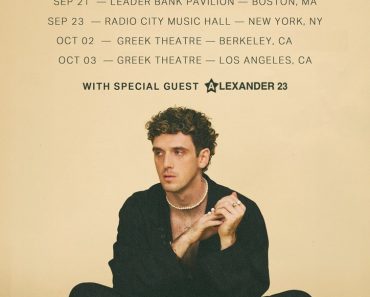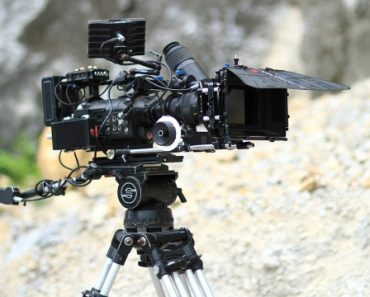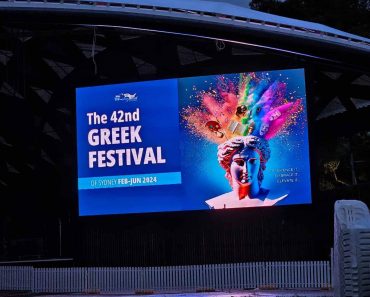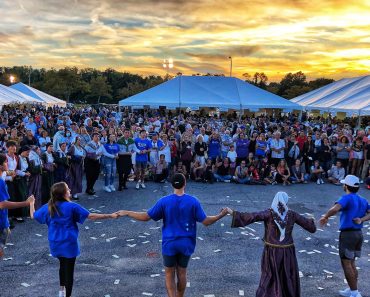When Foals were listening to Fela Kuti albums before, during, and after the recording of their first two albums, vocalist/guitarist Yannis Philippakis didn’t imagine he would ever have the opportunity to record with Kuti’s musical director and hugely inventive drummer, the late Tony Allen. Then, when the opportunity to meet with Allen at his Paris studio presented itself to Philippakis in 2016, he almost didn’t take it.
“I was feeling bushed,” remembers Philippakis, speaking from his kitchen in his London home. “I was going to try and move it. Somebody said, ‘It’s Tony Allen! Just get on the train and go.’”
Philippakis took that advice. He turned up in Paris to meet Allen, whom Philippakis says was “pleasantly dismissive” of him. But then they began playing together, and the seeds of Yannis & the Yaw were sown.
Yannis & the Yaw is not a solo project as much as it is a space for Philippakis’ musical experiments outside of Foals. The first offering is the five-song Lagos Paris London EP, recorded in Paris with Allen and his collaborators Vincent Taeger (percussion, marimba), Vincent Taurelle (keys), and Ludovic Bruni (bass, guitar).
As would be expected, the aptly titled, bicontinental EP has Afrobeat running through its veins, but its heavily percussive grooves trace a line to Philippakis’ distinct vocal tones, with some solid Foals-like guitar lines tying it all together. The handful of songs are markedly different from each other, but the EP feels like a cohesive package with just the right amount of music to come out of Philippakis’ Paris sessions.
“It feels in proportion to the experience,” Philippakis agrees. “This is what there is, and there’s nothing left.”
What was your first exposure to Tony Allen?
When I called Dave Sitek to discuss making Foals’ first record, Antidotes, one of the main things he said to me in this very intense phone call was: “Don’t listen to any rock records between now and when you come out to New York to make this record with me. Listen to Afrobeat. Listen to Fela. Listen to Tony Allen.” I bought Tony Allen’s all-encompassing Afrobeat collection. We used to hammer that in the house when all of Foals lived together.
But on the other side of it, Tony drummed on this song called “La Ritournelle” by Sébastien Tellier, which is one of the most beautiful, delicate, sprawling French moonlit ballads. To this day, it is one of my favorite songs. It took a minute to realize it was the same drummer on both. I was astonished that Tony had these two very different outlets for his music, but it was also identifiably him on both records.
Did you have other exposure to Afrobeat?
I was brought up listening to lots of West African and South African records because of my mum, who is from Cape Town. My mum self-exiled from South Africa and threw herself into Greece. When she was quite frequently nostalgic for South Africa, she would play South African records, but also Somalian, West African guitar stuff. I was surrounded much more by that type of music than I was ever by the Rolling Stones or the Beatles. That was never played in my house growing up. It was either Greek music or blues but mainly African records.
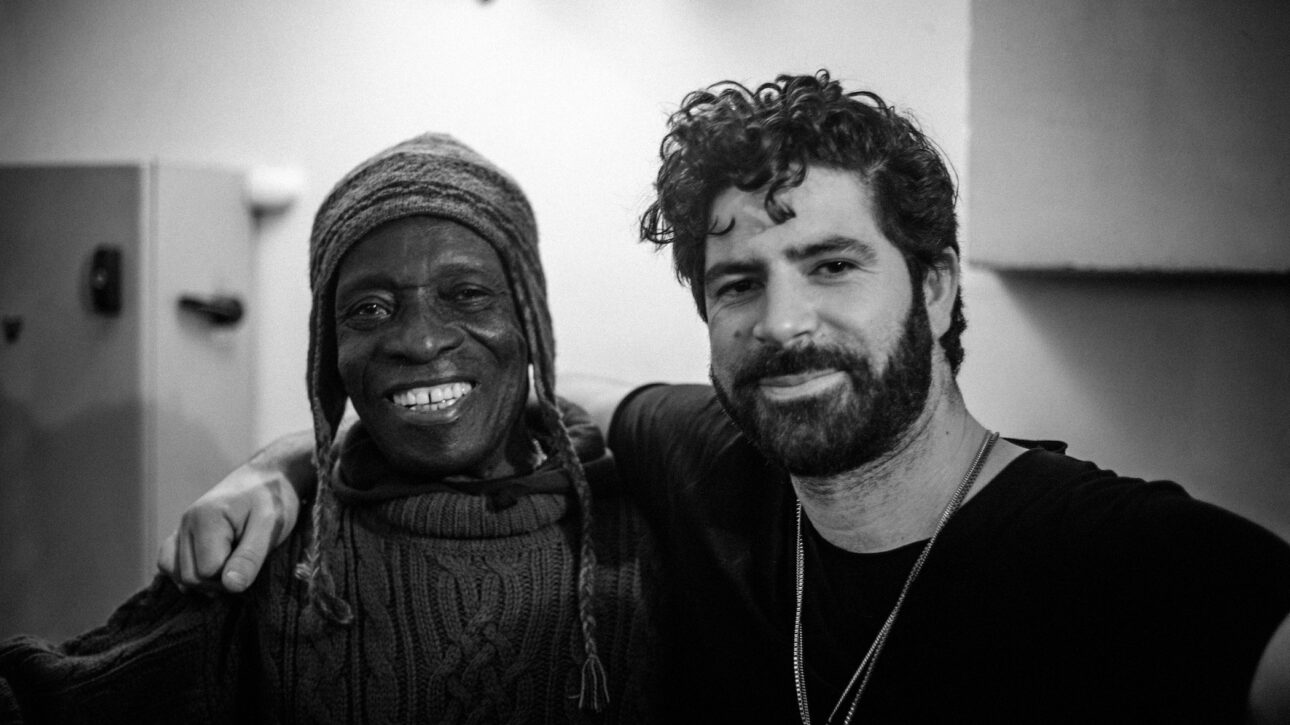
What was your first impression of Tony Allen’s drumming?
It’s like hearing a new language on a very familiar instrument. He made his own rhythmic language which, above all, feels good in the body. It’s one thing to come up with a technical fingerprint that’s new. That is hard in and of itself. But to do that and have it also still feel good to different generations of musicians from different cultures all around the world? It captures your mind in its complexity—and also in its difference from other styles of drumming. There’s so much rhythmic information. But it never stops feeling good. And he had no father in that. He came up with it. That’s the magic of it.
How was it for you to have Tony Allen be “pleasantly dismissive” when you came to his studio?
I got there quite early. It was clear he didn’t want to be there that early. He wasn’t rude, but he was getting on a little bit. He was probably stoned as well. Also, I think that was just Tony’s style when he first met people. He was slightly aloof. What was cool about it and what was liberating, and maybe this was intentional, he was so experienced at meeting musicians—sometimes it’s better to not know each other as people first and just play. Let the instruments do the connection for you. Your personalities fill in around that. Not to sound too cheesy, but we mainly communicated through music. The chatting was subsequent to that.
Did he know who you were?
He knew I was a musician from the U.K. who people had vouched for as being worth playing with. He definitely didn’t know I could sing. I remember when I started singing in the room with him, I saw, “Right, here we go” in his face. I was at the end of a tour, so I was super warmed up. I could holler in the room quite loud. We bonded quickly through the tracks.
Did the EP come together in that first meeting?
I was only there for a couple of days that first trip. The first thing we did on day one was “Walk Through Fire.” We were only together in Paris a handful of times. The EP is quite a special record in the sense that it came out of not that many days together and that’s all there will ever be.
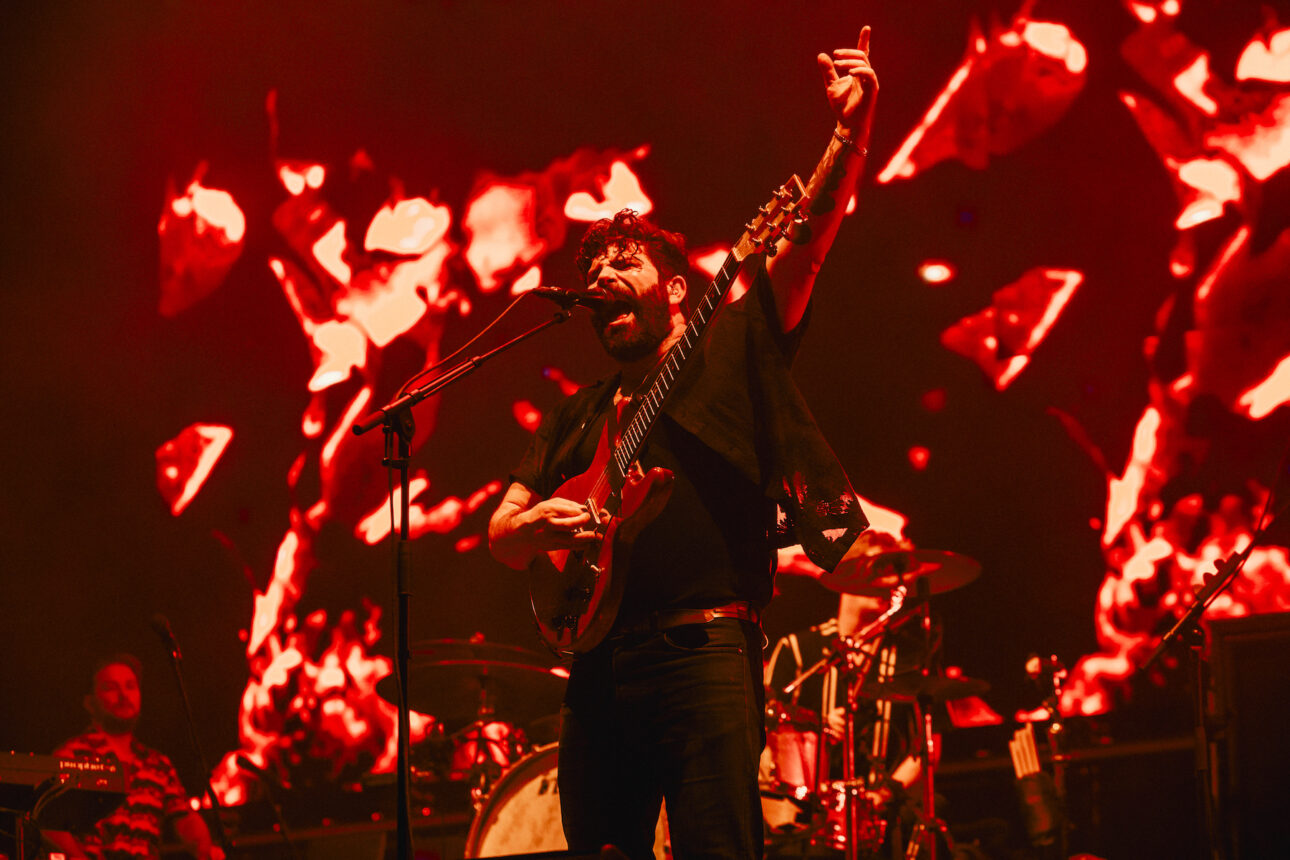
Did you go into that first session with song ideas?
I didn’t know that we would do more than one session. I didn’t know what to expect. “Walk Through Fire” was fully jammed. It’s a riff I would play in a soundcheck. For the second recording, I had a loop pedal with me. I went through some loops I’d pre-recorded badly, but they were ideas. The rhythmic pattern for “Rain Can’t Reach Us” was on my loop pedal.
I will often write guitar loops that are layered like that. There’ll be six guitars. In my mind, I’ve always thought it would be wicked if one of those layers was a marimba, the other layer was a xylophone, the other layer was a keyboard, and then one layer could be a guitar. I often think about the loops like that, but they never become orchestrated in that way. “Rain Can’t Reach Us” is an example where that happened. To me, it’s really exciting that it interlocks in that way.
What was the vibe with the other musicians in the room?
Tony was based in Paris for a long time, and they were all Parisian guys. They’d already made a record with him and recorded with Air and they’re working with Justice now. But they’d worked with Oumou Sangaré as well, and some other Malian musicians. They’re an interesting bunch because they’re classically trained, but they are also very adept at playing with African musicians from different regions. They were super friendly when I came in. They’re producers and musicians, so they were inside and outside the music. Without them, this project wouldn’t have become what it did. They were really excited to be involved. They kept me and Tony moving forward. They encouraged the whole thing by saying how special they thought it was, and how unique a collaboration it was. After Tony died, without them, it wouldn’t have been able to have been finished. They’ve been really integral to the whole thing. We’re going to do a couple of shows to release the record, and they’re going to be the ones playing.
How long did it take you to finish the EP?
From the first meeting to completion was half a decade. We had the first couple of bits then maybe six months went by and I went back and we worked a little bit more. I did that three or four times. Sometimes I’d go over intending to work with Tony for five days, but we’d only work three. He was my parents’ generation, but he was ageless and quite naughty. A lot of his behavior was not what you’d expect. Then he got busy. He started working on another record. Then I was back with Foals. We were going to try and do some more, [but] then it was COVID. Then he died.
Was it difficult to complete the work after his passing?
It took a bit of time to muster the energy in the right way to finish. Some things were basically complete. Other things, “Under the Strikes” in particular, we were going to open this sealed chamber of music we’d made to finish it. I felt like I trod delicately in decision making. We wanted to do what Tony would have wanted. Because I had the French musicians who had recorded with Tony in other contexts as well, when we were having the EP mixed, they would say to the mixer, “This is totally wrong. Tony had his bass drum up here in the mix.” We had the ability to make sure we did things as Tony would have wanted, which was quite reassuring. It made me feel like there was some wind in our sails. We were in the room. We made this with him. We are entrusted with this, and we’re going to do the right thing.
It’s amazing that this EP is possibly the last recordings of Tony Allen.
Making music with somebody, and then death happening, and being in proximity to mortality, but having this record at the end of it, it’s been an important experience for me. Understanding the power of meeting somebody and making something, those serendipitous encounters, meaningful ones where you make something are to be treasured and cherished, because, in many ways, that’s all that’s left at the end.



